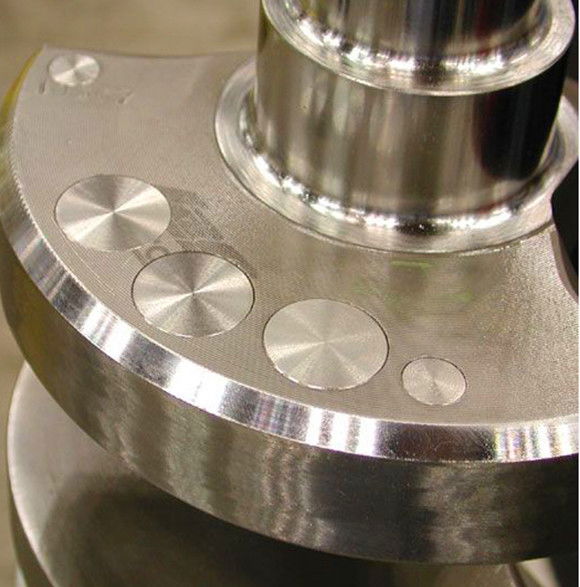Tungsten Crankshaft Balancing

Tungsten alloy crankshaft Balancing, sometimes casually abbreviated to crank, is the part of an engine, which translates reciprocating linear piston motion into rotation. A crankshaft is a part that connects to the piston rods and the flywheel of a car. It changes the motion of the pistons to power the vehicle. The crankshaft is the part that will makes the piston motion rotate. This engine part connects to the flywheel, and uses crank throws that connect the connecting rods to the cylinders.
How Does Crankshaft Balancer Work?
The rods and bearings connects the piston to crankshaft, when the piston moves up and down, then it is moved as describing a circle by the rods and bearings, then, it is rotating.
Advantages for Tungsten Alloy Crankshaft Balancer
It is necessary to provide counterweights for the reciprocating mass of each piston and connecting rod to improve balance in engines, and these are typically cast as part of crankshaft. Lead is cheap but the density is much lower than tungsten heavy alloy, and it is not environmental friendly, as for steel, tungsten alloy is more than twice the density of it, so compared with other materials, it is certainly considered t as the most appropriate crankshaft material for its properties as follows:
*Small volume but high density
*Excellent hardness
*Superior wearing resistance
*Good corrosion resistance
*Wonderful Shock resistance
*High melting point
*High temperature resistance
*Environmental friendly
Crankshaft balancing is crucial to engine performance. In race cars, aircraft or other high-performance engines, professionals who are serious about crankshaft balancing rely on Zhuzhou KJ Super Materials Co., Ltd. to provide the high-quality tungsten weights they need.
To determine which tungsten crankshaft weights will work best in your engine, it’s important to remember:
Regarding density:
Density of D17 tungsten = 17 grams/cc
Density of steel = 7.83 grams/cc
To determine the weight of high-density tungsten or steel:
Weight (grams) HD tungsten = Dia2(inches) x 12.87 x Length(inches) x 17
Weight (grams) steel = Dia2(inches) x 12.87 x Length(inches) x 7.83
When switching from steel to tungsten weights, every gram of steel removed is replaced with 2.17 grams of tungsten. You have therefore increased the weight 117%.
Example:
If you drill out 90 grams of steel and replace it with tungsten, you’ve replaced 90 grams with 195.3 grams. The net additional weight will be 105.3 grams.
195.3 – 90 = 105.3 grams
An easy way to calculate the net additional weight added when using tungsten is to multiply the grams of steel removed by 1.17.
90 x 1.17 = 105.3 grams added weight
The cost of tungsten weights will be higher because of additional material normally added to length.
We suggest you overbalance slightly and remove material to fine-tune crankshaft balancing. .
Crankshaft balancing isn’t always an easy process, but the added value to engine performance is well worth the effort. Let the experts at Zhuzhou KJ Super Materials Co., Ltd. help you apply the best tungsten weights available to solve even your most challenging crankshaft balancing issues.
Zhuzhou KJ Super Materials Co., Ltd. Offers Tungsten Alloy Crankshaft Balancing
We specialize in manufacturing and supplying WHA (tungsten heavy alloy) for almost 17 years. Our professional knowledge and experience in tungsten alloy crankshaft assures our products with high quality (in accordance with ASTM B 777-99 , which could be found at tungsten alloy grades) and competitive price. We supply not only standard crankshaft, but also manufacture according to your specific requirements.


